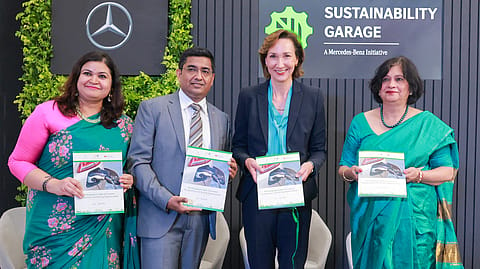Mercedes-Benz R&D India and TERI unveil whitepaper on skilling workers for EV charging infrastructure
In response to the findings of the whitepaper, MRDI and TERI have launched a skilling programme to bridge the skills gap in charging point operations.

Mercedes-Benz Research and Development India (MRDI), the largest R&D centre for Mercedes-Benz Group outside Germany, and The Energy and Resources Institute (TERI) have released a whitepaper highlighting the immediate need to skill India’s workforce for EV charging infrastructure. The whitepaper was unveiled at the third edition of the Mercedes-Benz Sustainability Dialogue.
The whitepaper underscores the pivotal role charge point operators (CPOs) play as the backbone of the EV ecosystem and identifies gaps in training as a major impediment to India’s transition towards clean mobility. Titled “EV Charging in India: Ecosystem Perspectives and Skilling Opportunities”, the study reveals that the key deterrents are the lack of hands-on training, non-standardised training modules, and a dearth of qualified trainers. The findings are based on consultations with 150 experts across the EV value chain.
Nearly half of the skill requirements for CPOs are for the installation and testing of EV charging infrastructure and Internet of Things (IoT)-enabled digital applications. Other areas of importance include troubleshooting faults, optimising the quality of service, and smart grid integration.
In response to the findings of the whitepaper, MRDI and TERI have launched the “Future-In-Change” skilling initiative under the ambit of Mercedes-Benz’s Sustainability Garage. The programme will offer a structured curriculum—approved by the National Council for Vocational Education and Training (NCVET) and endorsed by the Ministry of Environment, Forests, and Climate Change (MoEFCC)—which combines classroom learning with hands-on training on charging equipment.
“Sustainability goes beyond technology; it is about people,” said Manu Saale, MD & CEO, MBRDI. “With Future-In-Charge, we are not only bridging the skills gap but also tackling systemic barriers to EV skilling. By equipping young professionals with future-ready skills, we see this as a foundational investment in India’s mobility future and a model that can inspire similar initiatives globally,” he added.
The pilot cohort of 60 trainees has already commenced at TERI’s Gwal Pahari campus, where the trainees are being exposed to real-world scenarios pertaining to charging and case-based learning. There are also plans to scale the programme nationwide in partnership with CPOs, academic institutions, and industry stakeholders.
“With India accelerating its shift towards clean mobility, building a skilled workforce in EV charging infrastructure is crucial. Future-In-Charge is a forward-looking step to bridge industry needs with youth talent and empower professionals to lead India’s green jobs journey with expertise and confidence,” said Dr. Vibha Dhawan, Director General, TERI, in a statement.